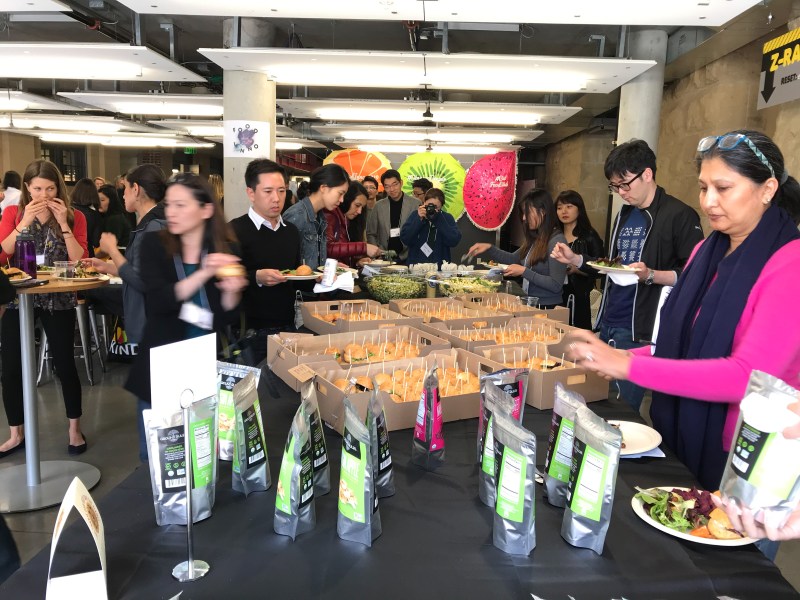On Thursday, Peterson Laboratory’s atrium was filled with over 150 attendees of the fourth annual FoodInno conference. The theme for this year’s day-long conference addressed the waste accumulated at every step of the food production process — a departure from the focus on technological innovation in the previous three conferences.
“In the past we focused a lot on what FoodInno needed to be, which is building this community of food innovators — so that was chefs, farmers, consumer packaged goods [businesses],” co-director Anand Upender ’19 said. “That was our base. This year, we thought it’d be interesting to look at a problem and rally around a cause.”
Design Director Marta Harding who works in the food practice at IDEO, a global design company, gave the opening keynote speech, titled “Designing a Food Future with Less Waste,” which spurred excitement among event organizers passionate about the food industry.
“We are so interested in being in the food space,” said FoodInno’s Head of Design and Social Media Noelle Chao ’20. “The trend is centered around sustainability, preserving our Earth and being less crappy to it.”
During the “From Pilot to Commercial” panel, a few entrepreneurs spoke about the “business side of food.” Director of Sustainability Jessica Vieira spoke about her company Apeel Sciences, which has for the last six years worked on designing a thin film around produce that would slow their respiration and thus spoiling by about five times its normal rate. Vieira also played a video demonstrating Apeel’s effect on rotting produce.
“We want to introduce a technology to an industry that’s really not used to a lot of change, so that’s challenging,” she said. “There’s a lot of fruits and vegetables that you don’t see in markets right now because they have such short shelf lives, like caviar limes. That was the first product we actually treated commercially. They had a shelf life of two days.”
Chief Executive Officer Minh Tsai also explained the origins of his tofu enterprise Hodo. He had hoped to model the traditional mom-and-pop tofu businesses from his childhood in Vietnam. But as Hodo scaled, its team had to consider the environmental impact of their produce, something that had not been needed in the small-scale production of tofu.
Stanford Sustainable Food Manager Dara Silverstein discussed the latest projects from Residential & Dining Enterprises (R&DE), which serves students over 12,000 meals a day. To monitor their food waste, R&DE uses software developed by students. Through computer analysis they were able to cut campus egg consumption, which represents 9 percent of dining’s greenhouse gas emissions, to 35,000 pounds per year, saving $39,000. The team is currently looking into hamburger consumption and will focus on chicken next.
Silverstein also gave an overview of the Food Donation Program, in which 30 students collect, weigh and deliver food every day to local groups, such as St. Francis of Assisi Church and elementary schools.
The day-long event welcomed 16 speakers total, including DoorDash’s Social Impact Manager Sueli Shaw, sweetgreen’s Vice President of Sustainability Kevin Quandt and Stanford Medicine professor Christopher Gardner, who rounded out the conference with his presentation titled “Maximizing the Intersection of Human Health and the Health of the Environment.”
The FoodInno Institution, which hosted the event, is a collaboration between Stanford and University of California, Berkeley to start conversations about food — from its social and environmental impacts to technological developments in agriculture. In addition to organizing the annual conference, the Institution has taught classes on both campuses and conducted international conferences and “food hackathons,” in which participants work to solve problems in product design, packaging and public awareness for local food companies and co-ops.
Previous speakers for the FoodInno Conference have included venture capitalists, food writers, scientists and entrepreneurs, like co-founder of Boba Guys and Tea People Andrew Chau and CEO of CafeX Henry Hu.
Contact Sonja Hansen at smhansen ‘at’ stanford.edu.
This article has been updated to reflect that IDEO is a global design company, not a product design company. The Daily regrets this error.
A previous version of this article listed the location of the event as the d.school’s atrium. While the d.school shares the space, the event was hosted by the Center for Design Research inside Peterson Laboratory. The Daily regrets this error.
